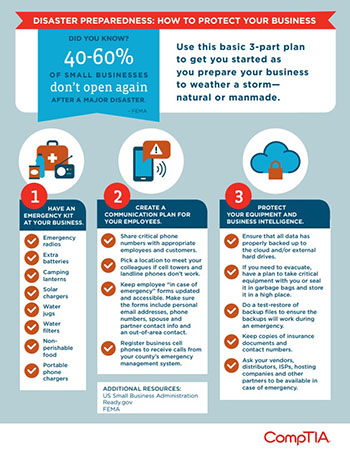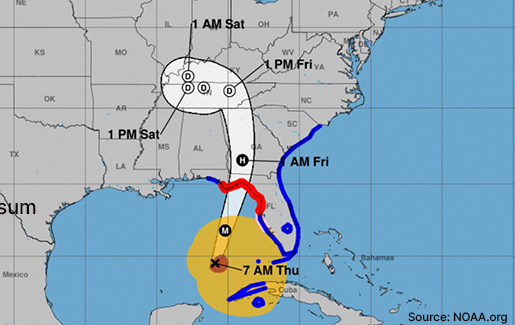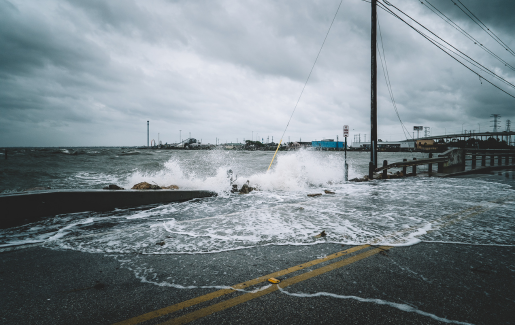-(updated-92724).png?sfvrsn=7f0731f7_2) Experiencing a natural disaster—or any emergency—can be a nerve-wracking experience. Guiding a business through that situation is even more stressful. Not only do you have to worry about your customers, you have to think about your employees, your offices, equipment and much more.
Experiencing a natural disaster—or any emergency—can be a nerve-wracking experience. Guiding a business through that situation is even more stressful. Not only do you have to worry about your customers, you have to think about your employees, your offices, equipment and much more.
It can be overwhelming, but if you take the proper precautions, plan out a strategy and rely on anything and everything in your power, you can not only survive, but thrive.
In this first part of a three-part series, we’ll examine advice from solution providers who successfully led businesses through hurricanes, tornadoes flooding and other disasters. This blog focuses on advice on how to manage employees through a disaster. Part 2 explores how to manage customers. Part 3 examines lessons the solution providers learned going through their trauma.
And make no mistake—disastrous situations are traumatic to virtually everyone involved. They impact everyone differently, but through strong leadership, community support and human resolve, businesses—and lives—will come out on top, the solution providers said.
Here are five things solution providers said can help when it comes to managing employees through a disaster:
Employees Come First
In the event of a natural disaster, you can’t help your customers if you haven’t first helped your employees, according to Fred Reck, president of InnoTeck Consulting, a solution provider based in Bloomsburg, Pa., a town devasted by torrential flooding of the Susquehanna River in 2013, following Tropical Storm Lee in 2011.
“Not even thinking about disasters, I always say my priorities are my team, customers, and the business—in that order,” Reck said. “We have to support each other. If the team needs help and isn’t getting it, you can’t support your clients.”
Companies that are loyal to employees will find that employees are loyal to them, he added. “Our team was quickly on board and ready to help with recovery efforts. Everyone wanted to be in the office. That’s a proud feeling,” Reck said. “One thing we did was tell everyone to take a five-gallon jug of water home and make sure they had a backup plan for their personal environments too.”
Preparation Counts
It’s imperative for the success of a business that everyone in the company be as prepared as possible, said Vince Gremillion, president of Restech, a Metarie, La.-based solution provider that survived through Hurricane Katrina in 2005.
“I would suggest get everybody together and go through a tabletop exercise. Find out if something happens, where would everybody go? What alternative numbers and personal emails can we reach you at? Go through a bunch of scenarios on how to handle as many situations as you can. If one person is unavailable, who takes over? Where does our data come from? Where is it stored? The more everyone knows, the better they will feel and the better prepared you will be if something happens,” Gremillion said. “Today, our building could disappear and we would still be 100% functional.”
Employees may be impacted very differently in a disaster. Some may not even lose power, some may lose their house—or worse. It’s important for the company to support employees through what can be a very difficult time, Gremillion said.
“You need to know what everyone’s personal situation is and how that could impact their commitment to the business. Does anyone have older relatives, special-needs children or pets? That could impact their availability to me,” Gremillion said. That’s OK, as long as you can plan for it, he added.
 Families are Important Too
Families are Important Too
Employees need to know that you are most concerned about their family and safety, according to Jim Perrier, CEO of Universal Data, a New Orleans-based solution provider severely impacted by Hurricane Katrina.
"Tell your employees to make sure that their families are cared for as soon as possible This means that they should submit information regarding their evacuation plans to their manager as early as possible. What will their action plan be if the storm is a Category 1, Category 2, or higher? At what point will they be evacuating and what is their destination?”
All pertinent information should be well documented and available to the head of personal or HR prior to hurricane season and updated, if possible, before any known potential threat is imminent.
Balance, Prioritize—and Have Backup
Just having a disaster recovery plan is a given, but it’s also important that the plan is flexible enough to account for unforeseen circumstances. Everyone helping each other out can achieve a lot of things, said Jennifer Mazzanti, CEO of eMazzanti, a Hoboken, N.J.-based solution provider that had its headquarters (as well as those of many customers) partially submerged by flooding after Hurricane Sandy in 2012.
“Every storm even now, we have certain employees on call. We ask for volunteers, those that won’t have family issues, and who makes sense. We also take equipment to higher land if there’s any threat of floods,” said Mazzanti.
After Hurricane Sandy, several employees that did not lose power hosted colleagues who had. When times are tough, people tend to rally together for each other, Mazzanti said. “It’s so important to be aware of who’s where, who might be impacted and who may not.”
Communicate Early and Often
When John Motazedi, CEO of SNC Squared, a Joplin, Mo.-based solution provider drove through mountains of debris wrought by a tornado that devastated the town in 2011, he wondered if he was lost. He couldn’t find his office—or much of anything else—where he expected it to be. Unfortunately, he wasn’t lost. The building was gone.
As word got out, employees started to panic, worried about their jobs and their future. Motazedi set all the fears aside with a simple sentence: We’re coming back.
“You need to communicate that early. Quench the fear that jobs are gone,” Motazedi said. “One of the most important things to them is that they still have jobs. We were in flux because of what happened, but we had a strategy to move forward, to get ourselves up and running and begin helping our clients. Once we had that, everyone started to relax and do what we needed to do.”
Motazedi also let employees know that their health insurance covered counseling and grief support. “We wanted to make sure they were aware that we had their back.”
“One of the biggest things to remember after a disaster is: This too shall pass,” said John Motazedi, president of SNC Squared, a solution provider that had his Joplin, Mo., headquarters destroyed by a tornado in 2011. “It’s really hard for six days, six weeks, six months, but you will get through it. A lot of it comes down to attitude. Your presence and your attitude as a leader go a long way to determine how well your team will adapt and work through it all.”
For more infomation, consider this checklist of how to prepare for, and survive, a hurricane or other emergency situation.

 Add CompTIA to your favorite RSS reader
Add CompTIA to your favorite RSS reader

